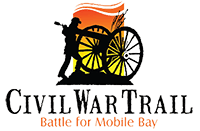CIVIL WAR TIMES
“For two days we have been very busy moving troops to Chattanooga. We have sent all the armed infantry from this place, nearly, to Chattanooga, which place General Bragg says is seriously threatened. …A large portion of the army at Tupelo is also to be transferred… as rapidly as possible…. General Bragg’s express order is that the movement shall not be noticed in the paper.”
-Lieutenant Stephen Croom, July 22, 1862, Assistant Adjutant General, Mobile
In July 1864, the war was not going well for President Abraham Lincoln’s administration. Washington was threatened by a southern army; Federal forces seemed to face stalemate in Virginia and Georgia; and a Union invasion of the Red River Valley in Louisiana had failed. Casualties were piling up and Northern voters were disenchanted with the war.
Lincoln believed he would lose the election in November to the peace Democrats. Southern armies could no longer win a decisive victory on the battlefield, but they could deny victory to the Union armies and seek a negotiated peace with Lincoln’s successor.


Strategic Value of Mobile Bay
Explore Civil War Strategies
Mobile wasn’t just the site of one of the major Civil War battles–she was key to successful Civil War strategies; not only because she lay at the head of a large and sheltered bay fed by the Alabama and Tombigbee river systems, but also because she connected the eastern and western halves of the Confederacy via the Mobile & Ohio and Mobile & Great Northern railroads. She not only processed and shipped cotton imported over these routes from Alabama plantations but also exported munitions and other supplies to the rest of the Confederacy along them. This railroad system also allowed the Confederacy to shift troops rapidly by rail from one theater of war to another–essential to victory in major Civil War battles.
Mobile and the Blockades
Explore Naval Blockade Civil War History
Mobile, after the fall of New Orleans in 1862, was the Confederacy’s premier cotton port and the leading destination in the Gulf of Mexico for confederate blockade runners, who faced the difficult task of slipping through the Mobile Bay naval blockade. Civil War efforts in the Confederacy relied on the export of cotton, shipped through the Port of Mobile to Europe by way of Havana. Importation of armaments, powder, salt, medicines, blankets, iron, rope, machinery, and other goods, including luxury items, did much to sustain Confederate Civil War strategies and morale. From January to August 1864, Mobile saw more activity from confederate blockade runners than any port in the Confederacy except Wilmington.

– William Rix, Mobile merchant

Paris of the Confederacy: Alabama in the Civil War
Mobile was a cosmopolitan city; in 1860 a quarter of its population were foreigners. It was a city beautifully built and adorned with flowers. Though plagued with the shortages inflicted by Civil War battles in Alabama, Mobile was characterized by a spirit of gaiety and was considered the Paris of the Confederacy. It abounded in oyster bars, coffee houses, saloons, beer and wine shops, gambling houses, dance halls, and theater. Thousands of Confederate soldiers and sailors fighting for Alabama in the Civil War, most of whom were young, were garrisoned at Mobile or were sent to one of its twelve hospitals to recover from wounds or illness, or simply passed through on their way to the front lines of Civil War battles in Alabama and elsewhere. As often as they could, these boys enjoyed what Mobile offered — and many married Mobile girls. One lady wrote that with plenty of girls and so many army and navy men in town, “how could it be otherwise but gay?” Even during the last winter of the war, hardly a night passed without a party.
– Lieutenant Stephen Croom, December 11, 1862, Mobile

